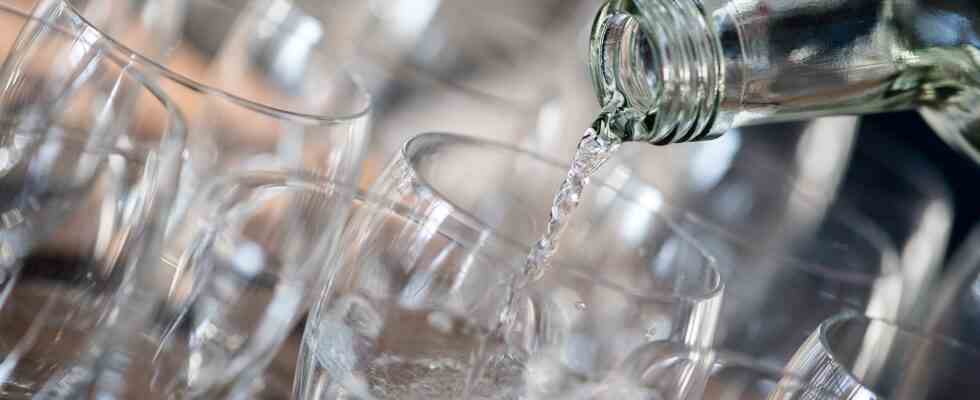Status: 06.10.2022 08:46 a.m
Beverage manufacturers across Europe cannot buy enough carbon dioxide. The first breweries have already had to stop part of their production. Consumers are also likely to feel the effects.
There are only six instead of the 28 tons of carbon dioxide actually required – and yet Gottfried Csauth’s worries have become somewhat smaller since Wednesday. The head of the Aktienbrauerei Kaufbeuren was able to receive a small delivery of carbon dioxide. His relief shows how tense the mood among brewers is at the moment. Because Csauth is happy about even the smallest amount. “It’s the first delivery since the end of August, and of course we’re not getting very far with it,” says Csauth. “But we take everything and are happy for every ton of carbon dioxide we get.”
Production stop and threatened short-time work
With the carbon dioxide supplied, Csauth now wants to produce a small amount of mineral water and lemonades again. Because he had stopped the manufacture of these products at the beginning of September. For two weeks, neither soda nor water rolled off the assembly line at the Aktienbrauerei Kaufbeuren. The beverage warehouse emptied, even short-time work for his 93 employees was in the room.
“It was sad. I didn’t know whether I would have to send my employees home tomorrow or what would happen next,” said the brewery boss. But even if he can breathe a sigh of relief now, Csauth remains tense. Because if it stays with the one delivery, he says, at least the lemonade production will soon come to a standstill again. The amount of carbonic acid is only enough for a few days to make all the products.
Also indispensable as an auxiliary substance
Carbon dioxide is an integral part of many non-alcoholic drinks such as mineral water or soda. But breweries are also dependent on carbon dioxide for beer. You need them as an auxiliary to “pre-stress” tanks, kegs and bottles so that the beer does not come into contact with air and does not foam during bottling. Ultimately, this increases durability.
But the market for carbonic acid, which is created by the reaction of carbon dioxide and water, is as good as empty. Mario Ĉurĉić is the German head of the SOL GROUP, a manufacturer of artificial gases based in Krefeld. According to Ĉurĉić, just over 50 percent of the carbon dioxide market is based on so-called ammonia synthesis, i.e. fertilizer production.
Due to the high natural gas prices, many fertilizer manufacturers have either shut down their production completely or significantly reduced it, according to Ĉurĉić: “This means that around 30 to 40 percent of the total amount of carbon dioxide that is required in Europe is currently missing.”
Lack does not affect everyone equally
As a result, the carbon dioxide tanks in many breweries are becoming increasingly empty. Those who have installed so-called recovery systems now have an advantage – i.e. special machines with which the carbon dioxide produced during beer fermentation is collected, cleaned and reused.
Financially and structurally, however, this can usually only be implemented for the large breweries such as Oettinger. According to the company, it can use such systems at three out of four production sites. This enables the brewery to produce more than half of the carbon dioxide it needs itself – and at least compensate for bottlenecks in phases. But Oettinger doesn’t do it entirely without buying additional carbon dioxide.
“Day by day” planning
Hardly anyone of the medium-sized breweries owns such a system – not even Riegele in Augsburg. The brewery currently employs 150 people and claims to have a turnover of around 30 million euros. A lot of Spezi is currently being bottled at Riegele – with carbon dioxide as an important ingredient. There is still a little of the valuable gas in the brewery’s tank, but managing director Sebastian Priller is happy about every batch that ends up in the crates.
“Of course you’re relieved with every bottling, but that can’t be a permanent condition,” says Priller. “At the moment there is a complete lack of planning security. It is a crisis – a really big crisis. We will get through it, but it’s an understatement to just say it’s challenging.”
You just plan from day to day. At Riegele, too, it cannot be ruled out that the company will soon no longer be able to produce products from the marginal range – such as individual lemonades. In addition, brewery boss Priller firmly assumes that there will be price increases for customers for beer and drinks overall.
Considers the lack of carbon dioxide to be a “really big crisis”: Sebastian Priller, head of the Riegele brewery in Augsburg.
Image: Michaela Neukirch
Hamsters is not a solution
At the same time, however, the brewers urgently advise consumers not to buy hamsters. Such behavior only leads to further problems, according to the industry. “Hamsters are counterproductive for our industry because we then run out of empties,” says Georg Schneider, President of the Bavarian Brewers’ Association.
Schneider assumes that there will be enough beer in winter – at least as far as the main varieties are concerned. However, he cannot rule out the possibility that breweries will stop producing certain specialty beers because of insufficient carbon dioxide supplies.
Such considerations also exist at the Aktienbrauerei Kaufbeuren and at Riegele in Augsburg. Here, too, one wants to limit oneself to the production and bottling of the main varieties if necessary. Managing Director Priller assumes that “carbonic acid will remain a scarce commodity – at least until the middle of next year”.

